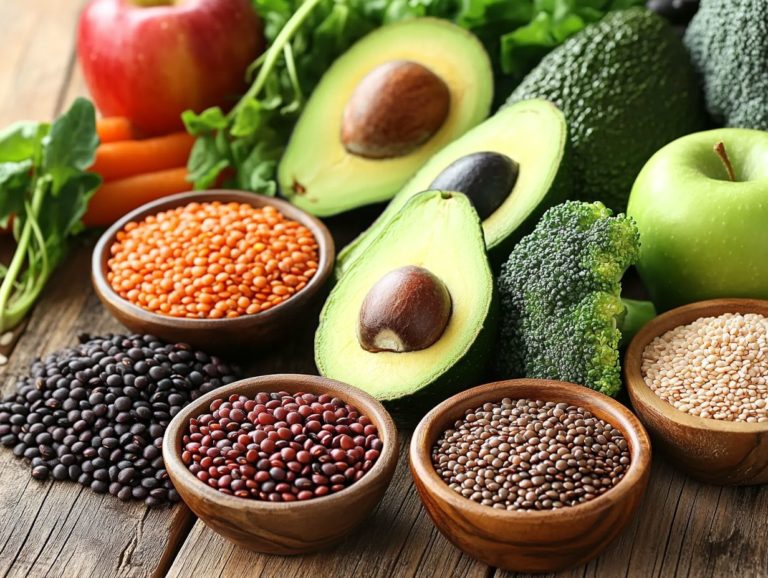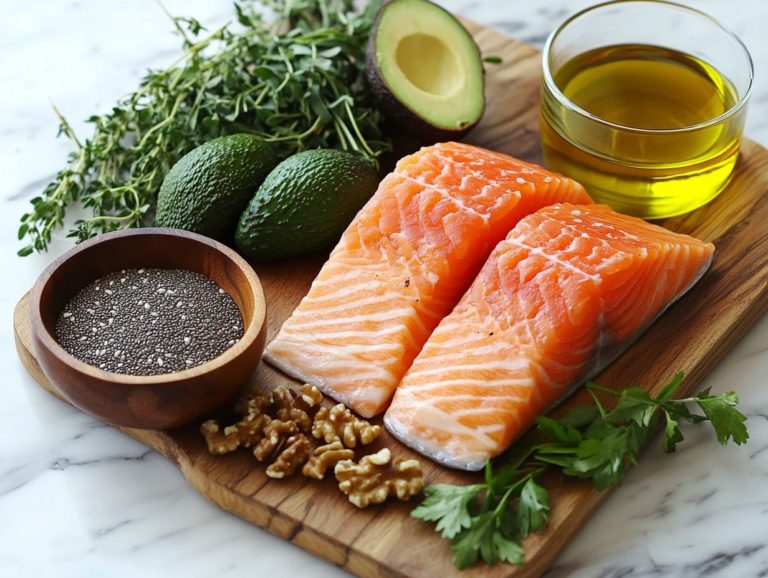What Is Intuitive Eating?
Intuitive eating represents a transformative approach to health, inviting you to reconnect with your body and its natural hunger signals.
In this article, you ll discover what intuitive eating truly is, explore its guiding principles, and trace its historical roots. You ll also uncover the myriad physical and mental health benefits that come along with it.
Get ready to learn practical steps that will change how you eat! You will also debunk common myths and clarify how this approach stands apart from traditional dieting.
Embarking on this journey toward mindful eating has the potential to fundamentally change your relationship with food and your body.
Contents
Key Takeaways:

Intuitive eating is a way of eating that focuses on listening to your body’s natural cues and needs, rather than following strict diets or meal plans.
It has been around for decades and has evolved to include principles such as rejecting the diet mentality and honoring your hunger and fullness.
This method has numerous benefits for both physical and mental health, including improved body image, reduced risk of disordered eating, and increased self-compassion.
What is Intuitive Eating?
Intuitive Eating is a simple method that prioritizes self-acceptance, mindfulness, and the acknowledgment of both emotional and physical hunger cues.
This philosophy, deeply rooted in psychological well-being, invites you to cultivate a healthier relationship with food by placing your trust in your internal signals.
Instead of succumbing to restrictive diets or rigid food rules that can often heighten negative body image and emotional eating patterns, you’re given the power to embrace a more balanced and fulfilling way of nourishing yourself.
Definition and Principles
The principles of Intuitive Eating focus on building a positive view of yourself and enhancing food satisfaction through being aware of what and how you eat.
This approach helps you reconnect with your intrinsic hunger cues, giving you the power to discern between true hunger and emotional eating.
By rejecting the pervasive diet culture that often breeds guilt and restriction around food choices, this philosophy champions body positivity and self-acceptance.
It emphasizes the importance of listening to your body, cultivating a balanced relationship with food, and reminding you that nourishment encompasses both the physical and mental aspects as well.
Through this compassionate framework, these principles invite you to explore eating behaviors that embrace variety, pleasure, and intuitive decision-making when it comes to your meals.
The History of Intuitive Eating
The journey of Intuitive Eating began in the early 1990s, crafted by dietitians Evelyn Tribole and Elyse Resch as a thoughtful counter to the restrictive norms of diet culture.
This innovative approach seeks to give the power to you to tune into your internal hunger signals and cultivate a sense of self-acceptance, transforming your relationship with food in a meaningful way.
Origins and Evolution of the Concept
Intuitive Eating has emerged as a vital alternative to weight loss programs and restrictive diets that often pave the way for eating disorders. It emphasizes a scientific understanding of food and your body s signals.
This approach invites you to reconnect with your intrinsic hunger cues and satiety signals, fostering a more harmonious relationship with food.
Unlike traditional diets that impose rigid rules and calorie restrictions, Intuitive Eating promotes personal choice and self-compassion. Instead of eliminating entire food groups, it encourages you to embrace mindfulness and the joy of eating, allowing you to savor your favorite foods without guilt.
The implications for your psychological well-being are significant. By embracing Intuitive Eating, you can alleviate anxiety and obsession around food, ultimately promoting a healthier self-image and a sustainable lifestyle.
The Benefits of Intuitive Eating

The advantages of Intuitive Eating reach well beyond simple weight loss. You may discover enhanced psychological well-being, a remarkable improvement in emotional regulation when confronting food cravings, and a more harmonious relationship with food.
This approach encourages a lasting balance that can transform your lifestyle in meaningful ways.
Join the intuitive eating movement today and discover a happier, healthier you!
Physical and Mental Health Benefits
Intuitive Eating brings remarkable health benefits. Improved body image, reduced dietary restraint, and heightened food satisfaction all contribute to a profound sense of self-care.
Research shows that people who practice Intuitive Eating report less anxiety and depression. They also develop healthier relationships with food.
A study published in the Journal of Nutrition found that participants who adopted this approach tended to eat more balanced meals, underscoring the link between mental well-being and dietary habits.
By tuning into your internal hunger signals rather than following rigid dieting rules, you may discover greater satisfaction in your meals. This can lead to sustained energy levels and improved physical health.
This approach nourishes your body and helps you develop a positive mindset, reinforcing the essential role of self-care in your lifestyle.
How to Practice Intuitive Eating
You can easily embrace Intuitive Eating by following these simple steps and techniques designed to heighten your awareness of hunger signals and emotional triggers.
This journey will ultimately guide you toward more mindful eating experiences and elevate your food choices.
Steps and Techniques for Implementation
Key techniques for implementing Intuitive Eating include practicing mindfulness, recognizing hunger signals, and allowing yourself to enjoy foods without guilt or judgment. Involving these strategies in your daily life can significantly enhance your relationship with food.
Mindfulness encourages you to engage fully during meals savoring each bite and appreciating the textures and flavors. It could be as simple as taking a moment before eating to breathe deeply, grounding yourself in the experience of the meal.
Recognizing hunger signals helps you distinguish between physical hunger and emotional cravings, promoting a deeper awareness of what your body truly needs at any given moment.
Embracing enjoyable foods means granting yourself permission to indulge without guilt. Picture this: incorporating a favorite dessert into your weekly meals, transforming it into a joyful experience rather than a forbidden temptation.
By using these practices, you will create a joyful and balanced relationship with food.
Common Misconceptions About Intuitive Eating
You may encounter numerous misconceptions about Intuitive Eating, many of which arise from deeply rooted beliefs in diet culture that prioritize restrictive eating and associate weight loss with improved health.
This mindset can lead to misunderstandings about the true purpose and benefits of this empowering approach.
Debunking Myths and Clarifying Misunderstandings

One prevalent myth is that Intuitive Eating promotes unrestricted eating without consideration for hunger signals, often blurring the lines between emotional and physical hunger and fostering negative body image issues.
In truth, this approach encourages a profound connection with your body and its signals, highlighting the importance of distinguishing true physical hunger from emotional cravings.
By honing in on these cues, you can cultivate a healthier relationship with food, ultimately leading to an improved body image and greater self-acceptance.
Research shows that when individuals learn to differentiate between emotional and physical hunger, they frequently gain a stronger sense of control over their eating habits. This reduces occurrences of mindless snacking and emotional overeating.
Such understanding nurtures a more compassionate dialogue around food and body, effectively dispelling common misconceptions about dietary freedom. Don’t fall for these misconceptions! Understanding Intuitive Eating can transform your relationship with food.
Intuitive Eating vs. Dieting
Intuitive Eating fundamentally sets itself apart from traditional dieting by championing self-acceptance and fostering intrinsic motivation in your food choices.
Instead of confining yourself to rigid food rules or weight loss programs that frequently give rise to negative emotions and long-term health issues, this approach encourages you to listen to your body and embrace a more holistic relationship with food.
Key Differences and Why Intuitive Eating May Be a Better Approach
The key differences between Intuitive Eating and dieting lie in the emphasis on self-acceptance, honoring your hunger cues, and building a healthy relationship with your food choices. This approach encourages a compassionate perspective on emotional eating, prompting you to consider your feelings rather than adhering to rigid rules when faced with food decisions.
Unlike traditional dieting, which often leaves you grappling with guilt and shame after indulging, Intuitive Eating fosters self-forgiveness. This shift enhances your emotional well-being and helps you listen to your body, leading to a more balanced relationship with food.
Embracing this mindset helps you value nourishing your body and ultimately bolsters your mental health. It breaks the cycle of binge-and-restrict behaviors typically tied to strict dieting.
Frequently Asked Questions
What is Intuitive Eating?
Intuitive Eating is a non-diet approach to eating that focuses on listening to your body’s cues and honoring your hunger, fullness, and satisfaction. It promotes a healthy relationship with food and your body without the use of strict diets or restrictions.
How is Intuitive Eating different from traditional dieting?

Intuitive Eating is not a diet; it is a mindset. Unlike traditional dieting, it does not focus on weight loss and instead encourages individuals to trust their bodies to guide them in making nourishing food choices.
What are the principles of Intuitive Eating?
The principles of Intuitive Eating include rejecting the diet mentality, honoring your hunger, making peace with food, challenging the food police, respecting your fullness, discovering the satisfaction factor, honoring your feelings without using food, respecting your body, and exercising self-care.
Is Intuitive Eating effective for weight loss?
Intuitive Eating is not a weight-loss program. While some individuals may experience weight changes as a result of practicing Intuitive Eating, the focus is on developing a healthy relationship with food and your body rather than on weight loss.
How do I get started with Intuitive Eating?
The first step to practicing Intuitive Eating is to reject the diet mentality. This means letting go of any restrictive or harmful dieting behaviors and embracing the idea that your body knows what it needs. It can also be helpful to work with a registered dietitian or therapist who is trained in Intuitive Eating.
Can Intuitive Eating work for everyone?
Intuitive Eating is a flexible approach to food and can benefit individuals of all ages, genders, and backgrounds. It is a process that may take time to fully embrace, but with practice and patience, anyone can learn to trust their body’s signals and cultivate a positive relationship with food and their body.






